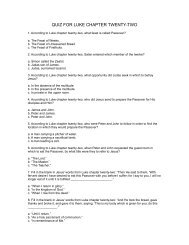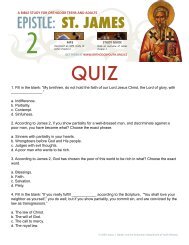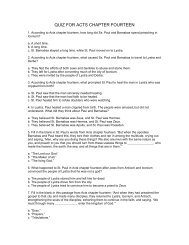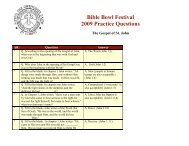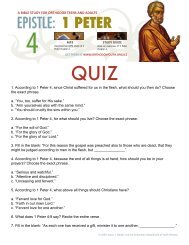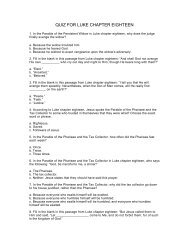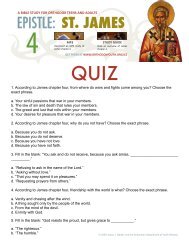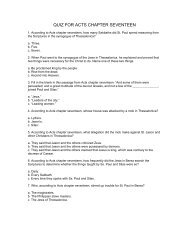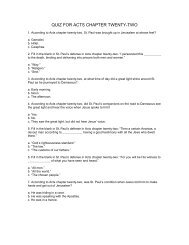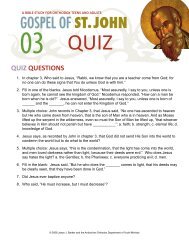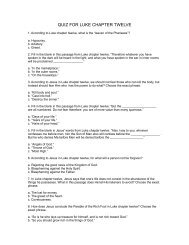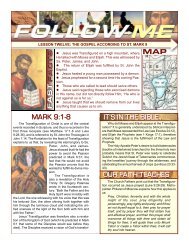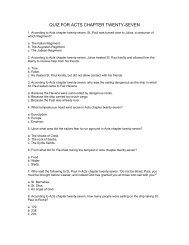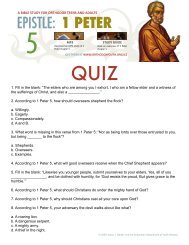You Can Read the Bible - Orthodox Christian Bible Studies
You Can Read the Bible - Orthodox Christian Bible Studies
You Can Read the Bible - Orthodox Christian Bible Studies
Create successful ePaper yourself
Turn your PDF publications into a flip-book with our unique Google optimized e-Paper software.
ORTHODOX<br />
CHRISTIAN<br />
BIBLE STUDY GUIDE<br />
YOU<br />
CAN<br />
ANCIENT SCRIPTURE... MODERN STUDY<br />
JASON J. BARKER<br />
READ THE<br />
BIBLE<br />
FREE ONLINE BIBLE STUDIES<br />
WWW.ORTHODOXYOUTH.ORG<br />
The <strong>Orthodox</strong> <strong>Christian</strong> <strong>Bible</strong> <strong>Studies</strong> site offers you a wealth of resources for personal and group <strong>Bible</strong> study. Our<br />
multimedia study applications have been featured in media outlets around <strong>the</strong> country, and our group study handouts<br />
are being used in churches around <strong>the</strong> globe. On <strong>the</strong> OCBS site you can find articles and audio/video resources about<br />
<strong>Bible</strong> books, ancient history, <strong>Orthodox</strong> beliefs and practices, and ways to build your life upon <strong>the</strong> truths of Scripture. We<br />
also feature a blog with <strong>the</strong> latest news about <strong>Orthodox</strong> media, <strong>Bible</strong> study resources, and Internet learning. We now<br />
also offer our new weekly radio program, broadcast on <strong>the</strong> stations of <strong>the</strong> <strong>Orthodox</strong> <strong>Christian</strong> Network! Visit us today!<br />
A ministry of <strong>the</strong> Department of <strong>You</strong>th Ministry - Antiochian <strong>Orthodox</strong> <strong>Christian</strong> Archdiocese of North America and <strong>the</strong> <strong>Orthodox</strong> <strong>Christian</strong> Network.<br />
YOU CAN READ THE BIBLE<br />
AN ORTHODOX CHRISTIAN GUIDE TO BIBLE STUDY<br />
This booklet was written and designed by Jason J. Barker. It was published<br />
through a partnership between <strong>the</strong> Department of <strong>You</strong>th Ministry - Antiochian<br />
<strong>Orthodox</strong> <strong>Christian</strong> Archdiocese of North America and <strong>the</strong> <strong>Orthodox</strong> <strong>Christian</strong><br />
Network.<br />
THE DEPARTMENT OF YOUTH MINISTRY<br />
Antiochian <strong>Orthodox</strong> <strong>Christian</strong> Archdiocese of North<br />
America<br />
PO Box 389<br />
Westwood, MA 02090-0289<br />
Phone: 781-461-1757<br />
www.antiochian.org/youth<br />
PHOTOS<br />
All teenagers in this booklet are members<br />
of Teen SOYO. Photos are property<br />
of <strong>the</strong> Department of <strong>You</strong>th Ministry - Antiochian<br />
<strong>Orthodox</strong> <strong>Christian</strong> Archdiocese<br />
of North America.<br />
The following photos were used under<br />
license from <strong>the</strong>ir respective vendors:<br />
Dreamstime: Blue batik/Joy Prescott;<br />
Blue abstraction/Jurgita Genyte; Vintage<br />
scrap paper/Dan Ionut Popescu; Abstract<br />
background element/Scott Maxwell;<br />
Falling water/Joy Prescott; Background<br />
design/Allyson Ricketts; Fractal<br />
22B/German Ariel Berra.<br />
Clipart.com: Israel; Jerusalem; A<strong>the</strong>ns;<br />
Rome.<br />
www.myocn.net<br />
Stock.xchng: Old paper/Linda B; Old paper/Vlad<br />
Tux.
THE LACK OF BIBLICAL KNOWLEDGE<br />
The <strong>Bible</strong> has been called “<strong>the</strong> most widely-owned book that no one reads.”<br />
This unfortunately is not an entirely inaccurate statement. Researcher<br />
George Barna has noted that, while 92 percent of American homes have<br />
at least one <strong>Bible</strong>, and 60 percent of Americans believe that <strong>the</strong> <strong>Bible</strong> is totally<br />
accurate in all it teaches, only a small percentage of people — in fact, only<br />
approximately 25 percent of American teenagers — read <strong>the</strong> <strong>Bible</strong> at least once<br />
per week. Fur<strong>the</strong>rmore, ano<strong>the</strong>r study found that 21 percent of <strong>Orthodox</strong> <strong>Christian</strong><br />
teens who are active in <strong>the</strong> Church say that <strong>the</strong>y never read <strong>the</strong> <strong>Bible</strong>.<br />
An email making <strong>the</strong> rounds aptly depicts <strong>the</strong> problem. Listing “Ten Hints <strong>You</strong> Need<br />
to Be in Sunday School,” it includes “when you open your <strong>Bible</strong>, your allergies<br />
explode because of all <strong>the</strong> dust;” “you think <strong>the</strong> minor prophets were a rock group<br />
in <strong>the</strong> 1960s;” and “your favorite <strong>Bible</strong> verse is, ‘Jesus went about doing good and<br />
casting out deacons.’”<br />
The problem, as Fr. Georges Florovsky states, is that we have lost our “scriptural<br />
mind.”<br />
THE IMPORTANCE OF HOLY SCRIPTURE<br />
The “scriptural mind” — reverence for, and knowledge about, Holy Scripture<br />
— is essential to <strong>the</strong> <strong>Orthodox</strong> spiritual life. <strong>Orthodox</strong> <strong>Christian</strong>s believe,<br />
in <strong>the</strong> words of Fr. Thomas Hopko, that in <strong>the</strong> <strong>Bible</strong> “one finds <strong>the</strong> selfrevelation<br />
of God and can come to a true and genuine knowledge of Him and His<br />
will and purpose for man and <strong>the</strong> world. In and through <strong>the</strong> <strong>Bible</strong>, human persons<br />
can enter into communion with God.”<br />
The <strong>Orthodox</strong> belief that Holy Scripture is a self-revelation of God, and through it<br />
we can come to know about God and His will for us, is based on several important<br />
factors clearly stated by St. Paul in 2 Timothy 3:16: “All Scripture is given by<br />
inspiration of God, and is profitable for doctrine, for reproof, for correction, and<br />
instruction in righteousness.”<br />
”Holy Scripture is Inspired<br />
The phrase “given by inspiration” in 2 Timothy 3:16 is translated from one word<br />
in koine Greek: Theopneustos, which is literally translated “God-brea<strong>the</strong>d.” This<br />
tells us that <strong>the</strong> truths contained in Holy Scripture are given directly by God, as<br />
St. Paul confirms in 1 Thessalonians 2:13: “For this reason we also thank God<br />
without ceasing, because when you received <strong>the</strong> word of God which you heard<br />
from us, you welcomed it not as <strong>the</strong> word of men, but as it is in truth, <strong>the</strong> word of<br />
God, which also effectively works in you who believe.”<br />
<strong>Read</strong> <strong>the</strong> four Gospels, as well<br />
as <strong>the</strong> Acts of <strong>the</strong> Apostles.<br />
ISRAEL<br />
This inspiration is important because God’s word is <strong>the</strong> only written standard that<br />
stands <strong>the</strong> test of time, and thus is a firmer foundation for our beliefs than our<br />
constantly changing opinions and emotions. The Holy Apostle Peter dramatically<br />
P<br />
A<br />
G<br />
E<br />
3
all <strong>the</strong> glory of man as <strong>the</strong> flower of <strong>the</strong> grass. The grass wi<strong>the</strong>rs, and its flower<br />
falls away, But <strong>the</strong> word of <strong>the</strong> Lord endures forever’” (1 Peter 1:24–25).<br />
The inspiration of <strong>the</strong> <strong>Bible</strong> does not mean that <strong>the</strong> biblical writers were merely<br />
secretaries who wrote <strong>the</strong> text as dictated to <strong>the</strong>m by God. Instead, as St. Peter<br />
informs us, “Prophecy never came by <strong>the</strong> will of man, but holy men of God spoke<br />
as <strong>the</strong>y were moved by <strong>the</strong> Holy Spirit” (2 Peter 1:21). The Holy Spirit conveyed<br />
to <strong>the</strong> biblical writers <strong>the</strong> truths to be expressed in Scripture, but <strong>the</strong> details of <strong>the</strong><br />
writing itself reflects <strong>the</strong> emphases and personal style of <strong>the</strong> individual writers. It is<br />
for this reason that each book in <strong>the</strong> <strong>Bible</strong> reflects <strong>the</strong> concerns of <strong>the</strong> age in which<br />
it was written and <strong>the</strong> viewpoint of <strong>the</strong> respective authors.<br />
Holy Scripture Teaches Doctrine<br />
<strong>Orthodox</strong> <strong>Christian</strong> doctrine — <strong>the</strong> teachings and beliefs of <strong>the</strong> Church — are<br />
rooted in Holy Scripture. This fact is so foundational to <strong>Orthodox</strong> <strong>Christian</strong>ity that<br />
Blessed Augustine tells us, “What more shall I teach you than what we read in <strong>the</strong><br />
Apostle For Holy Scripture fixes <strong>the</strong> rule for our doctrine, lest we dare to be wiser<br />
than we ought.”<br />
In teaching doctrine, Holy Scripture becomes our main written authority in all<br />
areas of life, as Fr. Thomas Hopko explains:<br />
Once <strong>the</strong> <strong>Bible</strong> has been constituted as <strong>the</strong> scripture of <strong>the</strong> Church, it becomes its<br />
main written authority, within <strong>the</strong> Church and not over or apart from it. Everything<br />
in <strong>the</strong> Church is judged by <strong>the</strong> <strong>Bible</strong>. Nothing in <strong>the</strong> Church may contradict it.<br />
Everything in <strong>the</strong> Church must be biblical; for <strong>the</strong> Church, in order to be <strong>the</strong> Church,<br />
must be wholly expressive of <strong>the</strong> <strong>Bible</strong>; or more accurately, it must be wholly<br />
faithful to and expressive of that reality to which <strong>the</strong> <strong>Bible</strong> is itself <strong>the</strong> scriptural<br />
witness.<br />
Holy Scripture Corrects Us<br />
The <strong>Bible</strong> not only teaches us doctrine, but it also corrects us when we err. Like<br />
a good priest, Holy Scripture will “Convince (or correct), rebuke, exhort, with all<br />
longsuffering and teaching” (2 Timothy 4:2).<br />
As you faithfully read <strong>the</strong> <strong>Bible</strong> <strong>the</strong>re will be occasions when a biblical passage will<br />
call to mind a sin of which you are guilty. The Holy Prophet Isaiah explains, “<strong>You</strong>r<br />
ears shall hear a word behind you, saying, ‘This is <strong>the</strong> way, walk in it,’ Whenever<br />
you turn to <strong>the</strong> right hand or whenever you turn to <strong>the</strong> left” (Isaiah 30:21). St.<br />
John Chrysostom similarly states, “Even one parable can help <strong>the</strong> soul to have<br />
contrition for a sin, to find a little rest from <strong>the</strong> concerns of <strong>the</strong> world. <strong>Read</strong>ing<br />
Scripture each day will accomplish some great and noble good in us.”<br />
Holy Scripture Instructs Us in Righteousness<br />
Many people know that <strong>the</strong> <strong>Bible</strong> warns us against things that we should not do;<br />
in fact, it seems that <strong>the</strong> knowledge many people have about biblical content is<br />
limited exclusively to <strong>the</strong> first words in some of <strong>the</strong> Ten Commandments: “Thou<br />
JERUSALEM<br />
<strong>Read</strong> <strong>the</strong> four Gospels, as well<br />
as <strong>the</strong> Acts of <strong>the</strong> Apostles.<br />
P<br />
A<br />
G<br />
E<br />
4
shalt not...” While Holy Scripture does contain many necessary warnings against<br />
sin, and provides much-needed correction, <strong>the</strong> point is not simply to rail against<br />
our failings: <strong>the</strong> focus of biblical teaching about humanity to is instruct us in<br />
righteous living. .<br />
St. Paul exhorts us to “exercise yourself toward godliness” (1 Timothy 4:7), and<br />
that we can do so by being “nourished in <strong>the</strong> words of faith and of <strong>the</strong> good<br />
doctrine which you have carefully followed” (4:6). Holy Scripture is inseparable<br />
from living a godly life; we can only grow in godliness by being nourished by <strong>the</strong><br />
words of faith and good doctrine contained in <strong>the</strong> <strong>Bible</strong>.<br />
St. John of Damascus presents us with a wonderful image of what it is like to be<br />
instructed in righteousness by Holy Scripture:<br />
All Scripture, <strong>the</strong>n, is given by inspiration of God and is also assuredly profitable.<br />
Wherefore to search <strong>the</strong> Scriptures is a work most fair and most profitable for<br />
souls. For just as <strong>the</strong> tree planted by <strong>the</strong> channels of waters, so also <strong>the</strong> soul<br />
watered by <strong>the</strong> divine Scripture is enriched and gives fruit in its season, viz.<br />
orthodox belief, and is adorned with evergreen leafage, I mean, actions pleasing<br />
to God. For through <strong>the</strong> Holy Scriptures we are trained to action that is pleasing to<br />
God, and untroubled contemplation. For in <strong>the</strong>se we find both exhortation to every<br />
virtue and dissuasion from every vice. If, <strong>the</strong>refore, we are lovers of learning, we<br />
shall also be learned in many things. For by care and toil and <strong>the</strong> grace of God <strong>the</strong><br />
Giver, all things are accomplished.<br />
Now that we have an understanding of why we should read <strong>the</strong> <strong>Bible</strong> as part of<br />
our spiritual discipline, we need to learn how to read <strong>the</strong> <strong>Bible</strong>. The foundation of<br />
biblical interpretation for <strong>Orthodox</strong> <strong>Christian</strong>s is <strong>the</strong> Tradition of <strong>the</strong> Church.<br />
SCRIPTURE AND TRADITION<br />
<strong>Orthodox</strong> <strong>Christian</strong>ity — based on Holy Scripture itself — believes that <strong>the</strong><br />
<strong>Bible</strong> can only be fully understood within <strong>the</strong> context of <strong>the</strong> Church and its<br />
Tradition. This belief is of <strong>the</strong> utmost importance for <strong>Orthodox</strong><br />
In his second epistle to <strong>the</strong> Thessalonians <strong>the</strong> Holy Apostle Paul exhorts,<br />
“Therefore, brethren, stand fast and hold <strong>the</strong> traditions which you were taught,<br />
whe<strong>the</strong>r by word or our epistle” (2 Thessalonians 2:15). St. Paul’s statement clearly<br />
implies two inseparable elements of <strong>Orthodox</strong>y: <strong>the</strong> oral word, and <strong>the</strong> written<br />
word. It is impossible to fully understand <strong>the</strong> meaning of Scripture without also<br />
understanding <strong>the</strong> teaching of <strong>the</strong> Church. The reason for interpreting Scripture<br />
within <strong>the</strong> context of <strong>the</strong> Church can be clearly seen in 1 Timothy 3:15, in which St.<br />
Paul says <strong>the</strong> Church is “<strong>the</strong> pillar and ground of <strong>the</strong> truth.” Because <strong>the</strong> Church<br />
— ra<strong>the</strong>r than <strong>the</strong> individual — is <strong>the</strong> pillar of truth, it is impossible to glean <strong>the</strong><br />
truth of Scripture apart from <strong>the</strong> teaching of <strong>the</strong> Church.<br />
<strong>Read</strong> chapter 17 of <strong>the</strong> Acts of<br />
<strong>the</strong> Apostles.<br />
ATHENS<br />
St. Ignatius Brianchaninov forcefully makes this point, “Do not consider it sufficient<br />
for yourself to read <strong>the</strong> Gospel alone, without <strong>the</strong> reading of <strong>the</strong> Holy Fa<strong>the</strong>rs! This<br />
is a proud, dangerous thought. Better, let <strong>the</strong> Holy Fa<strong>the</strong>rs lead you to <strong>the</strong> Gospel,<br />
P<br />
A<br />
G<br />
E<br />
5
as <strong>the</strong>ir beloved child who has received his preparatory upbringing and education<br />
by means of <strong>the</strong>ir writings.”<br />
The points we have studied so far — <strong>the</strong> reasons for reading <strong>the</strong> <strong>Bible</strong>, <strong>the</strong><br />
necessity of conforming our lives to <strong>the</strong> <strong>Bible</strong>, and <strong>the</strong> reasons why <strong>the</strong> <strong>Bible</strong> cannot<br />
be interpreted outside <strong>the</strong> teachings and practices of <strong>the</strong> Church — are clearly<br />
reflected in <strong>the</strong> words of St. Philaret of Moscow: “First, one must read (Scripture)<br />
with reverence, as <strong>the</strong> word of God, and with prayer for understanding of it; second,<br />
one must read it with pure intention, for establishment in <strong>the</strong> faith and motivation to<br />
good works; third, one must understand it in accordance with <strong>the</strong> interpretation of<br />
<strong>the</strong> <strong>Orthodox</strong> Church and <strong>the</strong> Holy Fa<strong>the</strong>rs.”<br />
We can now move on to methods for reading and studying <strong>the</strong> <strong>Bible</strong> as a spiritual<br />
discipline.<br />
METHODS FOR BIBLE STUDY<br />
Personal study of <strong>the</strong> <strong>Bible</strong> within <strong>the</strong> context of <strong>Orthodox</strong> <strong>Christian</strong>ity does<br />
not compromise <strong>the</strong> methods we can use to understand Scripture — it in<br />
fact increases <strong>the</strong> accuracy and vitality of our study by guaranteeing that our<br />
interpretation will be guided by <strong>the</strong> Holy Spirit through teachings and interpretations<br />
<strong>the</strong> <strong>Orthodox</strong> Church over two millennia. Within this context <strong>the</strong>re is a wealth of<br />
methods we can use to maximize our study of Scripture.<br />
Devotional <strong>Read</strong>ing<br />
If you engage in no o<strong>the</strong>r form of <strong>Bible</strong> study, you should at least engage in<br />
devotional reading. Devotional reading is an excellent way to develop <strong>the</strong> practice<br />
of study because it does not require any additional research tools; it involves only<br />
prayerfully meditating on a biblical passage. While this of course should occur<br />
in all <strong>the</strong> methods we will examine, it is <strong>the</strong> only activity in devotional reading.<br />
The purpose of devotional reading is aptly expressed by Staretz Nikon of Optina:<br />
“<strong>Read</strong> <strong>the</strong> Holy Gospel, be penetrated by its spirit, make it <strong>the</strong> rule of your life,<br />
your handbook; in every action and question of life act according to <strong>the</strong> study of<br />
<strong>the</strong> Gospel.”<br />
There are several practices you can utilize to make your devotional reading<br />
beneficial. First, you can consider what essential truth God is communicating in<br />
<strong>the</strong> passage. An obvious example would be reading <strong>the</strong> Gospel according to St.<br />
John. What do <strong>the</strong>se passages tell you about Christ How are <strong>the</strong>y reflected in <strong>the</strong><br />
<strong>the</strong>ology of <strong>the</strong> Church, and notably in <strong>the</strong> hymns sung in <strong>the</strong> Divine Liturgy These<br />
are ways in which you can meditate upon <strong>the</strong> truth in <strong>the</strong> <strong>Bible</strong>.<br />
Secondly, you can apply <strong>the</strong> passage directly to ourselves. As Bishop Kallistos<br />
Ware states, “We are to say to ourselves, ‘(These are not just distant places, events<br />
in <strong>the</strong> remote past. They belong to my own encounter with <strong>the</strong> Lord. The stories<br />
include me.’” For example, all <strong>the</strong> Gospels present <strong>the</strong> episode in which St. Peter<br />
betrayed Christ (Mat<strong>the</strong>w 26; Mark 14; Luke 22; John 18), and John presents <strong>the</strong><br />
subsequent episode in which our Lord reconciles Peter to Himself (John 21:17).<br />
ROME<br />
<strong>Read</strong> Acts 28 and <strong>the</strong> Epistle to<br />
<strong>the</strong> Romans.<br />
P<br />
A<br />
G<br />
E<br />
6
Bishop Kallistos suggests that <strong>the</strong>se passages can inspire us to reflect upon our<br />
acts of betrayal to God and o<strong>the</strong>rs, as well as our need to forgive <strong>the</strong> betrayals of<br />
o<strong>the</strong>rs.<br />
In order for devotional reading to be effective in changing your life, it is necessary<br />
to read <strong>the</strong> <strong>Bible</strong> every day. It is likely impossible for us to follow <strong>the</strong> practice of St.<br />
Seraphim of Sarov, who read a Gospel book each day (i.e., Mat<strong>the</strong>w on Monday,<br />
Mark on Tuesday, etc.), but we need a firm schedule to which we can adhere. Many<br />
<strong>Christian</strong>s attempt to read one chapter each day, while o<strong>the</strong>rs read a predetermined<br />
number of chapters each day that will enable <strong>the</strong>m to read <strong>the</strong> entire <strong>Bible</strong> in one<br />
year. Many <strong>Orthodox</strong> <strong>Christian</strong>s find it particularly helpful to read <strong>the</strong> passages from<br />
<strong>the</strong> Old Testament, psalms, epistle and Gospel assigned for <strong>the</strong> day.<br />
Topical Study<br />
A topical study can be one of <strong>the</strong> most exciting forms of <strong>Bible</strong> study as you select<br />
a subject and examine what <strong>the</strong> <strong>Bible</strong> says about <strong>the</strong> subject. A topical study can<br />
reveal many <strong>the</strong>mes and nuances that are both extremely interesting and very<br />
valuable to our spiritual growth.<br />
The first step in a topical study is creating a list of words related to <strong>the</strong> topic — a<br />
particularly useful tool when compiling this list is a <strong>the</strong>saurus. For example, if you<br />
are studying <strong>the</strong> subject of “peace,” you might create a list including such terms as<br />
bro<strong>the</strong>rhood, friendship, and unity.<br />
After creating a list of terms related to your topic, you would <strong>the</strong>n use<br />
a concordance to find occurrences of <strong>the</strong> subject in <strong>the</strong> <strong>Bible</strong>. If you<br />
want to really dig into your topic, you could <strong>the</strong>n look up <strong>the</strong> passages<br />
you’ve found in an interlinear <strong>Bible</strong>, which gives <strong>the</strong> text in both <strong>the</strong><br />
original Hebrew or Greek and an English translation. After finding <strong>the</strong><br />
Hebrew or Greek words for your topic, you would look <strong>the</strong>se up in<br />
Hebrew or Greek lexicons — this would let you learn <strong>the</strong> definitions<br />
for <strong>the</strong> original words, <strong>the</strong>reby allowing you to appreciate all possible<br />
meanings of <strong>the</strong> topic.<br />
<strong>You</strong> could extend your study by identifying factors related to <strong>the</strong> topic.<br />
For example, when studying “peace” you could examine what <strong>the</strong> <strong>Bible</strong><br />
says about some of <strong>the</strong> ways in which humans futilely pursue peace,<br />
as well as <strong>the</strong> thoughts and behaviors of biblical persons and saints<br />
that resulted in peace in <strong>the</strong>ir lives.<br />
If you are going to read <strong>the</strong> <strong>Bible</strong>, <strong>the</strong>re is a very<br />
important question you will need to answer: “What<br />
<strong>Bible</strong> translation and version should I use”<br />
The <strong>Orthodox</strong> Study <strong>Bible</strong> - available from Conciliar<br />
Press - uses an English translation of <strong>the</strong> Holy<br />
Scriptures, and includes helpful cross-references,<br />
study notes and articles for <strong>Orthodox</strong> readers.<br />
The <strong>Orthodox</strong> Study <strong>Bible</strong> is also <strong>the</strong> official translation<br />
for <strong>the</strong> <strong>Bible</strong> Bowl competitions in <strong>the</strong> Antiochian<br />
<strong>Orthodox</strong> <strong>Christian</strong> Archdiocese of North<br />
America.<br />
The final step is to examine <strong>the</strong> importance of <strong>the</strong> subject in our lives.<br />
<strong>You</strong> could begin by examining situations discovered in <strong>the</strong> previous<br />
step to determine how you should respond in similar situations.<br />
Book Study<br />
In a book study you attempt to discover <strong>the</strong> central <strong>the</strong>mes of a biblical<br />
book. A book study allows you to examine in detail <strong>the</strong> ways in which<br />
God dealt with His people in a specific historical context, as well as <strong>the</strong><br />
way in which <strong>the</strong> eternal truths of <strong>the</strong> book are applicable to us.<br />
P<br />
A<br />
G<br />
E<br />
7
There are a number of things I study and discuss when creating my online studies of<br />
New Testament books. This list is not exhaustive — <strong>the</strong>re is an almost endless list of<br />
things that can be examined in a book study — but I have found <strong>the</strong>m to be useful<br />
in gaining a working understanding of a biblical text.<br />
I begin by looking at <strong>the</strong> background of <strong>the</strong> book. Who is <strong>the</strong> author Under what<br />
circumstances — religious, political, and cultural — was <strong>the</strong> book written Who<br />
was <strong>the</strong> intended audience of <strong>the</strong> book These factors can greatly assist you in<br />
understanding <strong>the</strong> content and emphases of a specific biblical book.<br />
After studying <strong>the</strong> background of <strong>the</strong> book, I <strong>the</strong>n begin to look at <strong>the</strong> content of<br />
<strong>the</strong> book itself. I start with a broad overview, and <strong>the</strong>n increasingly study individual<br />
details. I <strong>the</strong>refore begin by surveying <strong>the</strong> general content of <strong>the</strong> book, outlining its<br />
development and identifying some of <strong>the</strong> main <strong>the</strong>mes of <strong>the</strong> writing. I <strong>the</strong>n look<br />
at each individual chapter, identifying first <strong>the</strong> main message of <strong>the</strong> chapter, <strong>the</strong><br />
way in which <strong>the</strong> writer develops this message, and <strong>the</strong> way this chapter relates to<br />
o<strong>the</strong>r chapters in <strong>the</strong> book. I <strong>the</strong>n look at <strong>the</strong> key words and ideas <strong>the</strong> writer uses<br />
to develop his message in this chapter. I finish by identifying and studying biblical<br />
cross-references, o<strong>the</strong>r verses in <strong>the</strong> <strong>Bible</strong> that also discuss <strong>the</strong> points made by <strong>the</strong><br />
writer in this biblical chapter.<br />
Finally, I think about ways in which I can live out <strong>the</strong> truths revealed in this biblical<br />
chapter. As with every method of <strong>Bible</strong> study, we should be changed<br />
by what we have read. Understanding how we should understand and<br />
apply to our lives <strong>the</strong> message of <strong>the</strong> biblical chapter and book is one<br />
of <strong>the</strong> central functions of most <strong>Orthodox</strong> <strong>Christian</strong> commentaries on<br />
<strong>the</strong> <strong>Bible</strong>. <strong>Read</strong>ing <strong>Orthodox</strong> commentaries will not only enable us<br />
to appreciate how <strong>the</strong> Church interprets <strong>the</strong> biblical passage we are<br />
studying, but it will also equip us to better incorporate into our lives <strong>the</strong><br />
spiritual significance of <strong>the</strong> passage. Commentaries are indispensable<br />
tools for <strong>Orthodox</strong> <strong>Bible</strong> study.<br />
CONCLUSION<br />
St. John of Kronstadt wonderfully expresses <strong>the</strong> importance of <strong>Bible</strong><br />
study in <strong>the</strong> spiritual life of an <strong>Orthodox</strong> <strong>Christian</strong>: “I especially<br />
love to read <strong>the</strong> Holy Scriptures, both Testaments. I cannot live<br />
without this reading. They contain so much. So many laws for <strong>the</strong> life<br />
of man’s soul are revealed <strong>the</strong>re! A person striving for spiritual renewal<br />
can obtain so much guidance in being reborn from evil to good.” <strong>You</strong><br />
will be able to express <strong>the</strong> same sentiment as you continue to engage<br />
in <strong>the</strong> transforming spiritual practice of <strong>Bible</strong> study.<br />
Look closely at a number of <strong>the</strong> photographs in<br />
this booklet. What do you see<br />
<strong>You</strong> see people studying <strong>the</strong> <strong>Bible</strong> as part of a<br />
group. While it is important to engage in personal<br />
<strong>Bible</strong> study, <strong>Orthodox</strong> <strong>Bible</strong> study is not exclusively<br />
a private practice - it is also an activity in<br />
which you engage as part of <strong>the</strong> <strong>Christian</strong> community.<br />
In addition to engaging in <strong>the</strong> private study we<br />
discuss in this booklet, get involved in a <strong>Bible</strong><br />
study group at your local <strong>Orthodox</strong> church. If<br />
<strong>the</strong>re is not such a group already, your priest and/<br />
or youth group leader will be happy to help you<br />
start one.<br />
P<br />
A<br />
G<br />
E<br />
8
© Copyright 2007 The Department of <strong>You</strong>th Ministry - Antiochian <strong>Orthodox</strong> <strong>Christian</strong> Archdiocese of North America and <strong>the</strong> <strong>Orthodox</strong> <strong>Christian</strong> Network.<br />
All rights reserved.



